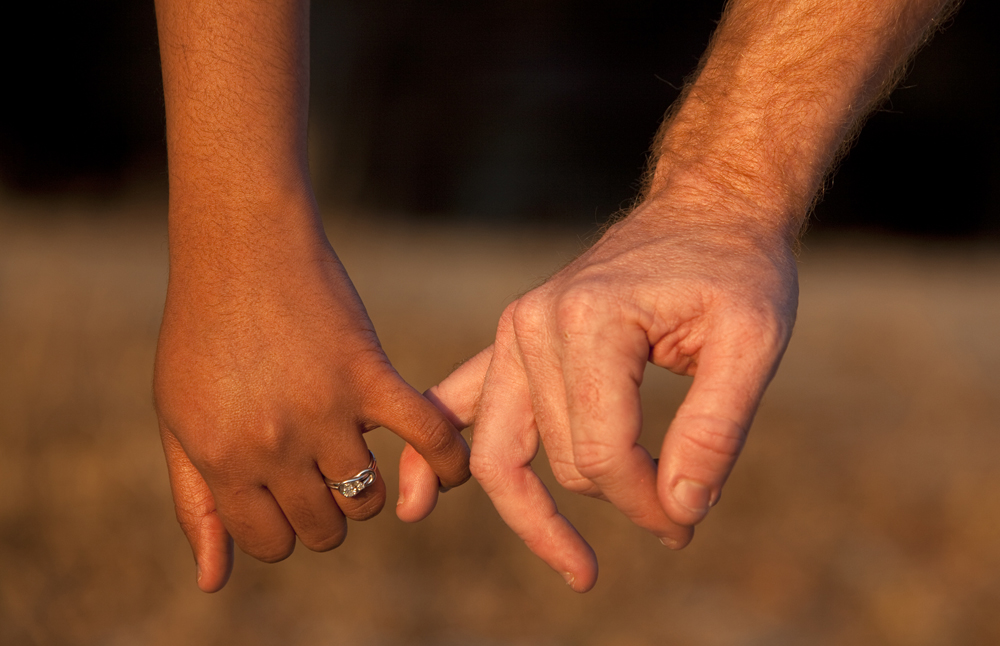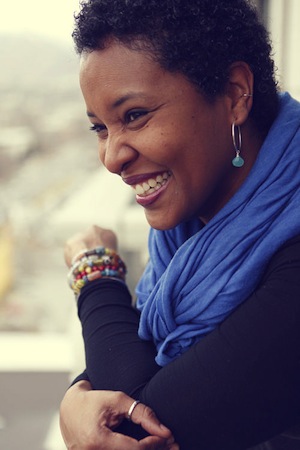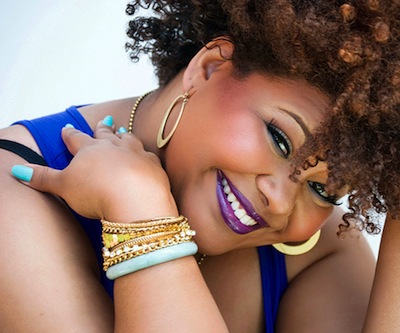
23 Jul Interracial Love: Happiness, Differences, and the Cultures in Between
The first thing I noticed about him was that the man could take an amazing photo.
The second thing was his gloriously red, curly hair. The third: he defiantly had an Obama bumper sticker on his pickup, when journalists weren’t supposed to have a public, political opinion.
We coexisted in professional obliviousness for several years, working together on assignments, and running into each other at mutual friends’ get-togethers. But it wasn’t until I left the newspaper that we noticed each other as more than deadline buddies.
He was more travelled than most Americans, and embraced my Trininess with curiosity and respect.
I fell. He proposed on Pirate’s Bay in Tobago. We’re getting married this year.
It never crossed my mind not to get involved because he is white. Did I notice he was white? Yes, but sort of like I’d notice what colour shirt he was wearing.
And maybe that’s mostly because of my Trinidadian upbringing. More than 20 percent of the population is mixed, the Central Statistical Office’s 2000 Census says. Which isn’t to say that Trinidadians aren’t race aware or that interracial relationships won’t raise eyebrows for some. But it is an environment where mixed race people are pretty much the norm.
I’m in the 20+ percent mix, a blend of East Indian, black, white, and Chinese—that I know of—which essentially means to me that I’m in no position to judge by race, nor am I inclined to.
One thing that I found hard to grasp, years ago, when I attended a historically Black college – in the U.S. – was the perceived taboo of dating someone white. Years later, and still living in ‘the States’, articles like this August 2011 Wall Street Journal piece – “An Interracial Fix for Black Marriage” – make me roll my eyes.
It prompted me to email this to a friend: “Why is this some epiphany that black women should expand their relationships outside their own race? Since when should race matter when it comes to love? It’s not about race. It’s about how the other person treats you, how they feel about you and show it, and how open they are to your own culture…NOT about the colour of their skin.”
But, unfortunately, everyone does not see it this way.
I reached out to Karen Walrond, a Trinidadian photographer and writer, who runs the popular Chookooloonks blog, and now lives in Houston, Texas, because she’s travelled internationally with her English husband of ten years, Marcus, and their mixed daughter, Alex. I was curious about her experiences.
She admitted that there were certain small towns in Texas they’d probably do well to avoid. Most of what she’s experienced is what she called “disbelief”. Nothing antagonistic or hostile. Just a kind of social disbelief that they could be a couple. And only in the U.S.
When they lived in Trinidad for a few years, it was the most relaxed and least conscious she’d ever been about the fact that they were an interracial couple, she said. I can believe that. People aren’t that overt in their reactions.
For Walrond, in the U.S., restaurant hosts get confused when she and her husband show up to claim a table for two. She also sees the disbelief, when they’re standing in a grocery checkout line, fingers strung together, and are treated as separate customers.
I know exactly what she means; I just didn’t have a word to describe it then. Case in point: when Sean and I moved into our new home, our new neighbour tried to leave muffins with me, when I answered the door. She gave a start and an embarrassed chuckle, when I introduced myself as the woman of the house. Disbelief.
I found it entertaining, part of me revelling in her discomfort. Still, it irked me.
I know that we could be in for far worse reactions – although Sean and I have never really experienced any overt prejudice or negative reactions about us, as a mixed race couple. But we’ve only travelled together mostly in major U.S. cities or in the Caribbean. When we do get startled looks from others, we meet the stares with stares of our own.
She makes her husband Marcus carry a family picture in his wallet …
Considering that Sean and I plan to have kids one day, it was startling to think that that could one day be my worry…That we’d have to decide if it was a viable solution to quelling other people’s confusion, even if we viewed their confusion as unfounded, if not silly.
Relationships of any kind should be defined by the character and compatibility of the people in them, not by skin colour. So I still don’t get why people can’t accept that two people, of two, different races, can and will be together. All I see is the beauty of it.
Being with someone from another culture teaches you new things. When Sean and I started seeing each other and it got serious, the biggest surprise to me was that I could be that comfortable with someone outside of my own culture.
Being with someone from another culture teaches you new things.
But Sean has lived in Turkey. He’s explored the streets of Jerusalem, surfed in Costa Rica, swum in Jamaica’s Dunn’s River Waterfalls, climbed the Mayan Ruins in Chicen Itza, and roamed the Grand Caymans and the Bahamas. In the U.S. Air Force, he worked alongside men and women from around the world. Best of all, his minister father and doting mother raised him to see way past colour and culture, and his upbringing and life education had not been limited to U.S. borders.
By the time I came along, his understanding, his willingness to learn, experience and embrace all I brought to the relationship was as much a part of him as my Trininess was a part of me. (Barring, of course, his occasional penchant of putting my pelau in tacos and being too lazy to look things up in his copy of “Cote Ce, Cote La”.) We learn from each other all the time.
When I talked to Patrice Grell Yursik, Trinidadian beauty bloggerati, who has been married to her white husband Steve for ten years, and lives in Chicago, she noted that their differences became their strengths.
“He has learned so much about Caribbean culture and black culture, and I’ve learned what it is to see the world through his eyes,” she told me.
Like me, she’d expected to marry a Trini. She’d even fought being attracted to Steve because of those expectations, but she didn’t close herself off to the possibilities. And he turned out to be her soulmate.
“We’ve made each other better people,” Yursik said. And that’s what it’s all about, right?
I spent 30 minutes chatting with Christelyn Karazin, who co-wrote the book “Swirling: How to Date, Mate and Relate Mixing Race, Culture and Creed” with Janice Rhoshalle Littlejohn to gain some insight to how Americans view interracial love. She gave me a bligh, she said, because African American history was not a part of mine.
The younger generation without scarring is infinitely more accepting, but the generation that experienced Jim Crow Laws, segregation, and the Civil Rights Movement is still alive, and the pain of unspeakable disenfranchisement is hard to forget and hard not to pass down, she said.
The younger generation without scarring is infinitely more accepting…
She helped me to truly understand on a personal level the historical prejudices that existed around me and Sean in the U.S. Of course, understanding our current environment doesn’t mean that I agree with the varied and long held biases or judgments that come with it.
Undeniably, Trinidad has its own unique cultural, racial and class prejudices that I don’t have the word count to explore. Yursik told me that she’s lost friends and at least one family member because of her relationship with Steve. But my upbringing taught me that regardless of the views of others, racial mixing and my own ethnic make-up are beautiful. I’m grateful for that. Even moreso, I’m grateful for my family and his, focused as they are on our happiness rather than our differences. That should be the norm—everywhere.
But, as much as I wax poetic about the beauty of interracial relationships, and how they should be accepted and the norm, the fact is that Sean and I don’t operate in a perfect world and that people do judge us for being together, because our skin tone and our cultures are so completely different. That’s something I frankly do not agree with, but will have to come to accept.
Do I think it’s stupid? Yes.
Will I ever accept it, as it unfolds? Never.
I will live and love him. I will return the stares with defiance. I will have to deal with the challenges that we can’t even fathom now. I will protect our children, as best as I can, and help raise them to celebrate their ethnicity and their cultural duality. And I will try not to engage ignorance that could lead to violence. It is the best that we can both do.
I’ve said it before and I’ll say it again: a good man is a good man, whether he’s purple, pink or orange. If there’s anyone in my space – family, friends or strangers – who can’t deal with that, then I offer a scathingly polite ROCK SO.
Main photo by Sooz Reyno White.
About Kari Cobham
Kari Cobham is a Trinidad-born, Florida-based writer, editor and social media strategist. A former award-winning journalist at The Daytona Beach News-Journal, her work has been featured on MSNBC’s Today Books, Orlando Sentinel, the3six5 lifestream project and SHE and Caribbean Beat magazines. She currently works for former Philadelphia 76ers president Pat Croce, running public and media relations, social and online media, and content management.
Twitter •




keifel
Posted at 10:57h, 23 Julyon the other side of the coin, my white wife more often than not will get the cheque handed to her or even if we came in together ask if we’re getting separate cheques.
Ps Mon
Posted at 14:57h, 23 JulySo true, its amazing to see the stolen glances, the second look..
baidawi
Posted at 20:34h, 23 JulyWhen I read the title “Interracial” relationships I thought it was about relationships between humans and other races. Then I read further and realized it was about different ethnic backgrounds.
Bradley W
Posted at 14:04h, 30 JulyHmmm we might have to get you checked out.
Pingback:Kari Cobham Dishes on What’s it Like for West Indians Swirling in America « Beyond Black & White
Posted at 15:25h, 24 July[…] Original post: Outlish Magazine […]
Nichole Melhem
Posted at 23:58h, 29 JulyThat’s me..*sigh*
Nickybw
Posted at 05:57h, 03 AugustI remember this grumpy woman complaining to my white husband about trimming the hedge, he was gracious, safe private school accent, but being a man forgot all about it.So she knocked on the door, I answered, mix up Trini with de accent, her jaw dropped when she asked for the house owner and I said that was me.She said that was impossible and asked to see the man she has spoken to before, I said that was my husband. Ah still laughing at her face.
I agree I never noticed his colour, I noticed the person inside.